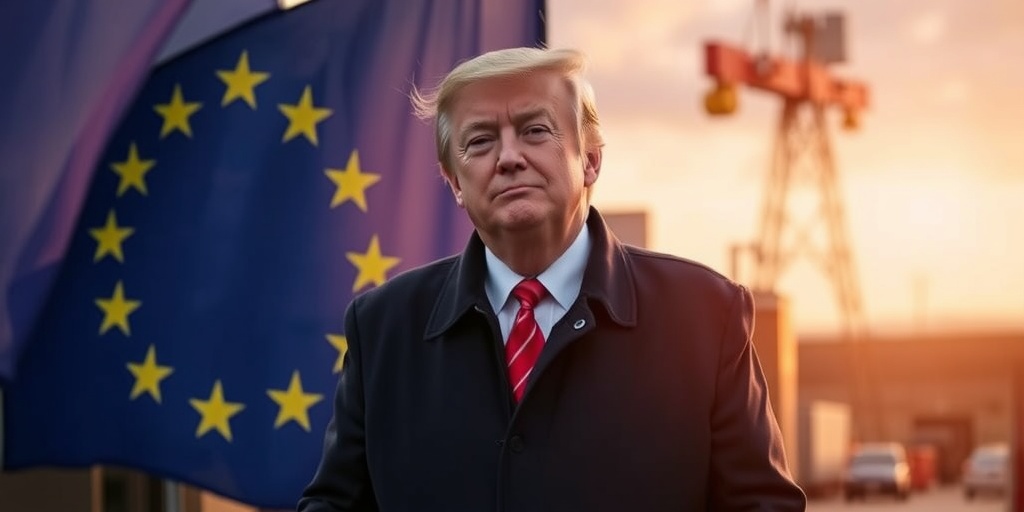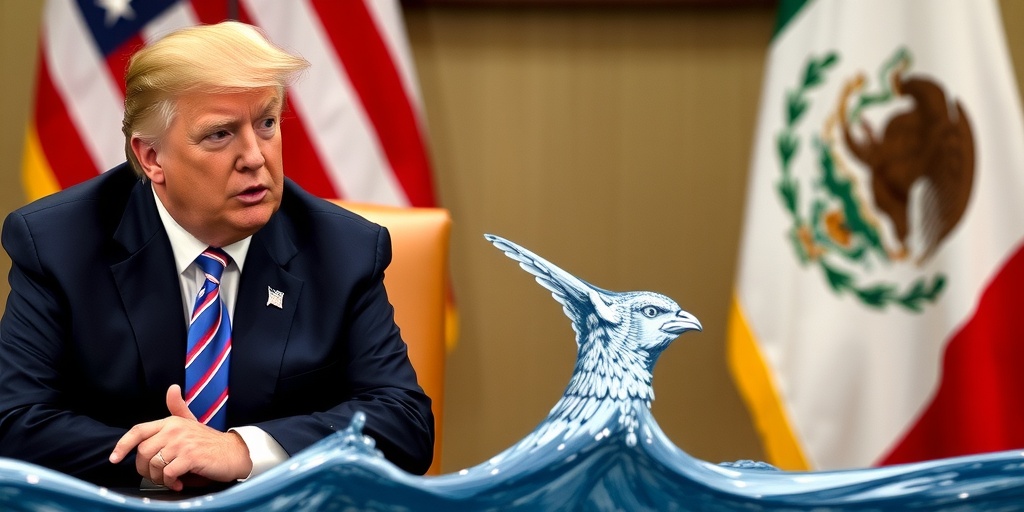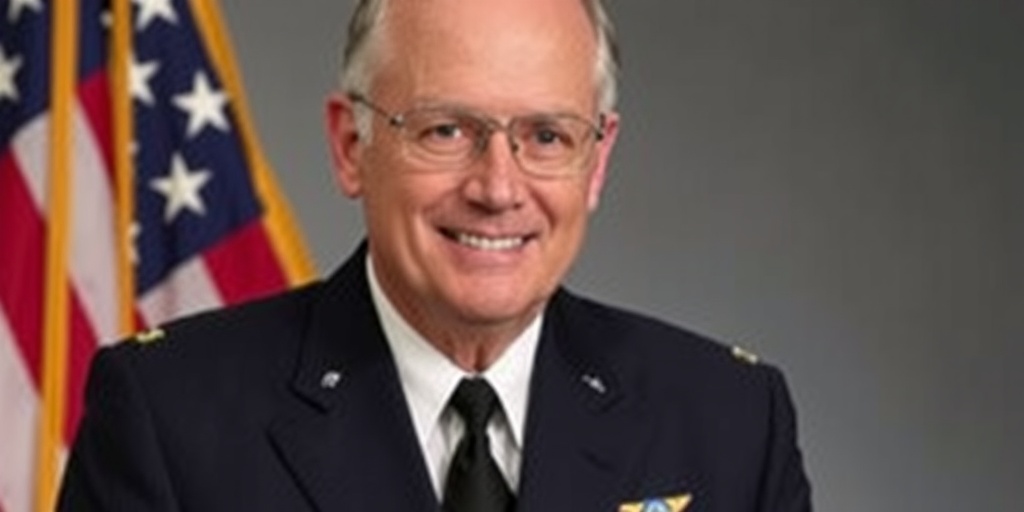Now Reading: Autoworkers Union Leader Offers Mixed Take on Trump’s Tariffs
-
01
Autoworkers Union Leader Offers Mixed Take on Trump’s Tariffs
Autoworkers Union Leader Offers Mixed Take on Trump’s Tariffs

UAW President Shawn Fain Criticizes Trump’s Tariff Policies While Acknowledging Some Support
In a recent address streamed on platforms like YouTube, Shawn Fain, the president of the United Automobile Workers (UAW) union, voiced a complex stance regarding the Trump administration’s tariffs on imported goods. Fain expressed partial support for targeted tariffs aimed at reviving manufacturing jobs in the United States, while simultaneously condemning President Trump’s global tariff strategy as "reckless."
During his address to UAW members, Fain asserted that while he believes some tariffs could benefit the automotive manufacturing sector and similar industries, he strongly opposes what he views as politically motivated tariffs, particularly those connected to issues such as immigration and the ongoing fentanyl crisis. “We support the use of some tariffs on automotive manufacturing and similar industries. We do not support tariffs for political games,” he emphasized, adding that “reckless tariffs on all countries at crazy rates” are detrimental.
This address appears to be a strategic move by Fain to distance himself from Trump, particularly given past criticism he has faced for appearing to align with a president whose administration has frequently been at odds with organized labor. Over the past year, Fain rallied for Democratic presidential nominee Kamala Harris, often using charged rhetoric to describe Trump, including labeling him a “scab” and highlighting the administration’s hostility toward workers’ rights.
In his remarks, Fain clarified, “We are not aligning everything we do with the Trump administration. We are negotiating with the Trump administration.” This statement underscores his intention to assert the independence of the UAW amid the political landscape’s shifting dynamics.
Fain’s speech also addressed the detrimental effects of free trade agreements, notably the North American Free Trade Agreement (NAFTA), which he claims have led to the outsourcing of American jobs and the closure of approximately 90,000 factories across the nation over the past three decades. This industrial decline has hollowed out once-flourishing manufacturing hubs, such as Flint, Michigan, and Gary, Indiana. Fain pointed out that these job losses and factory closures have triggered significant anger and disillusionment among workers, prompting a portion of the workforce, traditionally aligned with Democratic values, to consider Trump’s perspective.
Stressing the need for a reassessment of free trade policies, Fain declared, “We have to end this free trade disaster, and we don’t care whether it’s a Republican or Democrat who does it.” His words resonated with the urgency of protecting U.S. manufacturing jobs and reestablishing a robust industrial base.
Fain also highlighted the potential for American automotive giants, namely General Motors, Ford Motor, and Stellantis, to harness their existing, yet underutilized, manufacturing capacities to create thousands of new assembly jobs. He argued that making full use of these facilities could significantly contribute to job creation, directly benefiting the American workforce.
However, despite his measured support for certain tariff policies, Fain made it clear that he disagrees with “90 percent of what the Trump administration is doing.” He articulated his concerns regarding the administration’s budget cuts to crucial research institutions like the National Institutes of Health, which he argued have detrimental effects on critical research, particularly in cancer and other severe health conditions.
Highlighting broader concerns, Fain lamented the erosion of bargaining rights for numerous federal workers, the attacks on the National Labor Relations Board, and the illegal termination of board members. He criticized cuts to essential programs such as Social Security and Medicare that many members of the working class rely on for their basic needs.
Interestingly, Fain chose not to address Elon Musk during his speech, despite Musk’s prominent role in the Trump administration and his aggressive push for large-scale cuts to federal employment and funding for various agencies, including education and veterans’ affairs. Musk, the CEO of Tesla, has been a vocal opponent of UAW efforts to unionize Tesla workers, further complicating the labor landscape for American manufacturing.
Fain also pointed to recent events affecting immigrant students, mentioning the case of Mahmoud Khalil, a Columbia University graduate who faced arrest by federal immigration agents. Khalil had previously worked as a student instructor represented by the UAW. The UAW’s involvement in issues extending beyond traditional labor is a testament to the union’s commitment to advocating for the rights of all workers, including students.
In summary, Shawn Fain’s address highlights a nuanced position on trade and labor issues within the current political framework. With a clear emphasis on protecting American manufacturing jobs, he seeks to balance union interests while critiquing the broader policies of an administration that often clashes with labor’s objectives. As the UAW navigates its relationship with the Trump administration, Fain’s leadership will likely continue to be defined by this complex interplay of support and criticism.
Stay Informed With the Latest & Most Important News
Previous Post
Next Post
-
 01New technology breakthrough has everyone talking right now
01New technology breakthrough has everyone talking right now -
 02Unbelievable life hack everyone needs to try today
02Unbelievable life hack everyone needs to try today -
 03Fascinating discovery found buried deep beneath the ocean
03Fascinating discovery found buried deep beneath the ocean -
 04Man invents genius device that solves everyday problems
04Man invents genius device that solves everyday problems -
 05Shocking discovery that changes what we know forever
05Shocking discovery that changes what we know forever -
 06Internet goes wild over celebrity’s unexpected fashion choice
06Internet goes wild over celebrity’s unexpected fashion choice -
 07Rare animal sighting stuns scientists and wildlife lovers
07Rare animal sighting stuns scientists and wildlife lovers





















